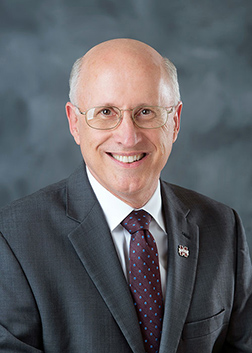Shaw to offer US land-grant university perspective during FAO international academic roundtable

David Shaw
Mississippi State University Provost and Executive Vice President David Shaw will discuss the importance of U.S. land-grant universities in addressing complex global problems during a virtual event hosted by the Food and Agriculture Organization of the United Nations this week.
Shaw is one of five panelists and the only U.S. representative participating in the FAO’s Third Annual Academia Perspectives Roundtable, beginning at 6 a.m. CT on Monday [Nov. 15]. Marcela Villarreal, the director of FAO’s Partnerships and U.N. Collaboration Division, will serve as moderator. Registration for the Zoom event is available at https://bit.ly/30eBLYh.
According to the FAO, the program is designed to “inform participants on the FAO Strategic Framework 2022-2031, highlight the need for stronger and strategic engagement with the academia and research community at country-level, and bring a voice to academia perspectives for transforming partnerships with FAO through the principles of Better Production, Better Nutrition, Better Environment and Better Life to achieve efficient, inclusive, resilient, and sustainable agri-food systems.”
Shaw will discuss the significant expertise and capacity MSU and its fellow land-grant universities can utilize when working with international organizations like FAO to achieve greater food security for the world’s growing population and the many related issues it involves.
“Comprehensive research institutions like Mississippi State have an extraordinarily broad capacity to partner, including social, physical, and biological sciences, as well as the arts and humanities. Our faculty members have well-rounded expertise that helps inform decision makers as they work toward a better future,” Shaw said. “All of us recognize the grand challenges we face today cannot be addressed by a single discipline. For example, food insecurity cannot be simply addressed by producing more food; social vulnerability must also be addressed if we are to make further advancements in food security.”
Since 2010, Mississippi State and FAO have worked together closely to develop and enhance animal and veterinary public health, plant and fish health, food safety and nutrition programs. In 2014, FAO designated MSU as a Center of Knowledge and a member of the Global Aquaculture Advancement Partnership.
The university’s partnership with FAO includes numerous projects focused on aquaculture health and biosecurity. For example, MSU and FAO worked to develop a progressive management pathway for aquaculture biosecurity in developing countries. The program creates a four-level development plan for countries to keep their fish supply safe from animal diseases and develop emergency response plans. The partnership is also training the next generation of food security leaders.
Additionally, Margaret Khaitsa in MSU’s College of Veterinary Medicine serves on the One Health High-Level Expert Panel to advise key international organizations on the potential emergence and spread of new diseases, among other areas. The 26-member panel advises the FAO, World Organisation for Animal Health (OIE), United Nations Environment Programme (UNEP), and the World Health Organization (WHO). One Health is a holistic approach that recognizes the links between the health of people, animals and the environment.
MSU also is home of the Feed the Future Innovation Lab for Fish funded by the U.S. Agency for International Development and part of the U.S. Government’s Feed the Future initiative to reduce poverty and improve health outcomes for global populations dependent on aquaculture- and fisheries-led economies.
MSU is Mississippi’s leading university, available online at www.msstate.edu.
Jim Laird | Public Affairs



